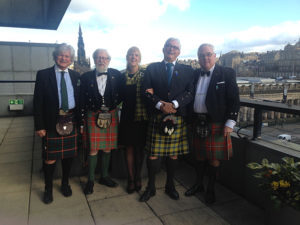The annual general meeting of the Royal Celtic Society is taking place in Edinburgh this Friday.
For nearly 200 years, the Royal Celtic Society has been at the cutting edge of activity to support the language, literature, music and culture of the Highlands and Western Islands of Scotland.
The society holds regular events for members, awards medals for excellence in music and literature and sponsors a wide range of organisations dedicated to the traditions, language and arts of the Highlands and Islands.
This year’s AGM will take place in the Dome Room, HM New Register House, Edinburgh at 5pm on Friday, October 6.
This will be followed by a reception where the guest of honour will be Dr Joseph Morrow QC, the Rt Hon the Lord Lyon King of Arms.

Royal Celtic Society members Elizabeth and David Waterton-Anderson, with Lucilla Noble
Dr Morrow will formally present the society with its new Coat of Arms, before giving a brief talk on the work of Lyon Court in the 21st century.
This is a rare opportunity for members to see this magnificent part of Scotland’s architectural heritage, and to meet and talk to the Lord Lyon.
The cost of the reception is £20 per head, which will include wine, canapes and soft drinks.
The Celtic Society was founded in Edinburgh in 1820 by Sir Walter Scott, General David Stewart of Garth and a group of Highland gentlemen.
The society’s first meeting was in Oman’s Tavern, situated very close to where Register House now stands.
It quickly became established as the principal promoter and guardian of the heritage of the Highlands and Islands, playing a prominent role in George IV’s historic visit to his Scottish capital in 1822.

Members of the Royal Celtic Society
The Royal Celtic Society was in the vanguard of the Highland renaissance that began in the early 19th century and its role in promoting the language, literature, tradition and culture of the Highlands and Islands was recognised with the grant of a Royal Charter by Queen Victoria.
It is as important today as it was then to preserve the history, language and arts of the Scottish Highlands and Islands.
The Royal Celtic Society’s members are people with a passionate commitment to that end. The society achieves that objective by awarding prizes for excellence in the arts and through a programme of annual and one-off grants to Highland games, music festivals, piping and clarsach groups, folk museums, educational projects including Gaelic playgroups, and literary projects.
Visit www.royalcelticsociety.scot for more details on the society.
TAGS

